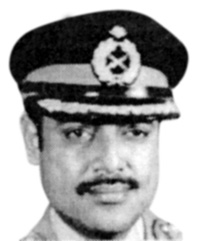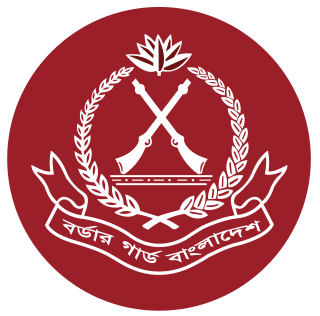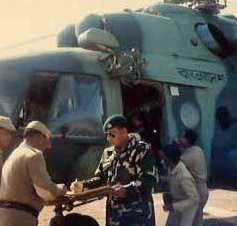
Khaled Mosharraf, Bir Uttom was a Bangladeshi army officer who is known for his role in the Bangladesh Liberation War and the subsequent coups in post-independence Bangladesh. After deposing Khondakar Mustaq Ahmad in the 3 November 1975 coup, Mosharraf was assassinated on 7 November 1975.

The Border Guard Bangladesh (BGB) is a paramilitary force responsible for the border security of Bangladesh. The BGB is entrusted with the responsibility to defend the 4,427 kilometres (2,751 mi) border of Bangladesh with India and Myanmar. It was formerly known as the Bangladesh Rifles (BDR).

Bangladesh has undergone several changes of government since the Proclamation of Independence in 1971. Between the first recorded uprising in August 1975 and the last known attempt in December 2011, Bangladesh has been through as many as 29 military coups.

Sahara Khatun was a Bangladesh Awami League politician and a cabinet minister. She was the incumbent Jatiyo Sangsad member representing the Dhaka-18 constituency, and was the presidium member of the party.

The Bangladesh Rifles revolt was a mutiny staged on 25 and 26 February 2009 in Dhaka by a section of the Bangladesh Rifles (BDR), a paramilitary force mainly tasked with guarding the borders of Bangladesh. The rebelling BDR soldiers took over the BDR headquarters in Pilkhana, killing BDR director-general Shakil Ahmed along with 56 other army officers and 17 civilians. They also fired on civilians, held many of their officers and their families hostage, vandalised property and looted valuables. By the second day, unrest had spread to 12 other towns and cities. The mutiny ended as the mutineers surrendered their arms and released the hostages after a series of discussions and negotiations with the government. Prime Minister Sheikh Hasina, who returned to office less than two months before the revolt, was widely praised domestically and internationally for her handling of the mutiny. However some criticised her for not ordering an armed raid of the BDR Rifles compound. The Daily Star commended "her sagacious handling of the situation which resulted in the prevention of a further bloodbath".
Pilkhana is a para-military cantonment in Dhaka. It is the headquarters of Border Guard Bangladesh, located to the south of Dhanmondi in Dhaka of Bangladesh.
2009 (MMIX) was a common year starting on Thursday of the Gregorian calendar, the 2009th year of the Common Era (CE) and Anno Domini (AD) designations, the 9th year of the 3rd millennium and the 21st century, and the 10th and last year of the 2000s decade.

Jahangir Alam Chowdhury, is a retired three-star general of the Bangladesh Army and former Chief of the Bangladesh Rifles during the conflicts with Border Security Force of India and skirmishes with Banga Sena militant group in the Bangladesh–India border.
The 2011 Bangladesh coup d'état attempt was a coup planned for 11–12 January 2012 that was stopped by the Bangladesh Army in December 2011. This was announced at a press conference on 19 January 2012. The purpose of the coup was to establish Islamic law in Bangladesh. A number of officers including retired ones were arrested. The coup plotters argued that they were nationalists trying to prevent Bangladesh from being turned into a puppet of India.

Lieutenant Colonel Syed Mir Ali Imam Al Mamun is a retired Officer of Bangladesh Army and the head of the aristocratic Padamdi family of Rajbari, present day Bangladesh.
Major General Khaled Mosharraf was assassinated on November 7, 1975. He was a Bangladeshi military officer who was the Sector Commander of Bangladesh Forces Sector 2 and K-Force Brigade Commander during the Bangladesh Liberation War.
Gulzar Uddin Ahmed, also known as Colonel Gulzar Ahmed, was the founding director of the intelligence wing and also served Additional Director General of Rapid Action Battalion. Until his death, he was a Colonel of the Bangladesh Army and also Sector Commander and Deputy Director General of Bangladesh Rifles.

Aziz Ahmed is a retired Bangladeshi four star general who was Chief of Army Staff (CAS) of the Bangladesh Army, from 25 June 2018 to 24 June 2021. He was succeeded by General SM Shafiuddin Ahmed on 24 June 2021.
Operation Dal-Bhat was an operation carried out by Bangladesh Rifles to provide grocery items to low income groups in Bangladesh. The operation was carried out during the Caretaker Government of Fakhruddin Ahmed. It was one of the main reasons behind the Bangladesh Rifles Mutiny of 2009. Colonel Mujibul Haque who was killed in the mutiny was in charge of the operation. The mutineers demanded their share of the profits from the operation.
Mohammad Mainul Islam is a retired lieutenant general of the Bangladesh Army. He is the former Principal Staff Officer of the Armed Forces Division and Chief of General Staff (CGS) of the Bangladesh Army. He also served as Director General Bangladesh Rifles. He is currently the president of the Bangladesh Archery Federation.

The 15 August 1975 Bangladesh coup d'état was a military coup launched by mid ranking army officers in Bangladesh on 15 August 1975. The officers were part of a conspiracy to assassinate Sheikh Mujibur Rahman, the founding father of Bangladesh, who led the independence struggle during the Bangladesh Liberation War and later served as the first and fourth president and later in between his two presidential terms served as the second prime minister of Bangladesh from April 1971 until his assassination in August 1975. Sheikh Mujibur Rahman and most of his family members were killed during the coup, with the exception of his two daughters Sheikh Hasina and Sheikh Rehana.
Mohammad Rafiqul Islam is a retired Bangladesh Army major general and former Director General of Border Guards Bangladesh.
Mojibul Hoque was a Bangladesh Army officer and commander of Operation Dal-Bhaat. He was killed in the Bangladesh Rifles mutiny in 2009.
Taskforce for Interrogation Cell, also known as TFI Cell, is a Bangladesh government special interrogation cell operated by Bangladesh's intelligence forces and special police units. It is located inside Rapid Action Battalion headquarters in Uttara, Dhaka. The Guardian described it as Bangladesh's most notorious torture cell. The other interrogation cell is called Joint Interrogation Cell.

Quadrat Elahi Rahman Shafique was a Colonel in the Bangladesh Army who died in the 2009 Bangladesh Rifles mutiny.










